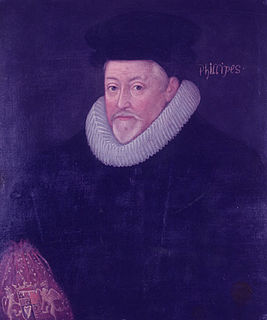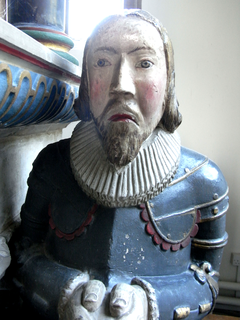| Sir Robert Johnson MP | |
|---|---|
| Born | c 1537 |
| Died | 1622 |
| Nationality | English |
| Occupation | Politician |
Robert Johnson (c 1537 – 1622) was an English politician who sat in the House of Commons from 1597 to 1614.

The House of Commons of England was the lower house of the Parliament of England from its development in the 14th century to the union of England and Scotland in 1707, when it was replaced by the House of Commons of Great Britain. In 1801, with the union of Great Britain and Ireland, that house was in turn replaced by the House of Commons of the United Kingdom.
Johnson was the eldest son of William Johnson of Crawley, Buckinghamshire. He was a surveyor and succeeded to the properties at Crawley on the death of his father in 1558. He was Keeper of Gawle, Forest of Dean in 1591. In 1597, he was elected Member of Parliament for Monmouth Boroughs where he was named to committees on weights and measures and pawnbrokers . He was re-elected MP for Monmouth in 1601 and took a strong line in parliament then on temperance issues. He proposed, for example, on 3 November that innkeepers who failed to restrain habitual drinkers should suffer corporal punishment. In 1602 he was clerk of deliveries of the ordnance. He was knighted on 10 July 1604. In 1604 he was re-elected MP for Monmouth. He was re-elected MP for Monmouth in 1614. [1] [2]

The Forest of Dean is a geographical, historical and cultural region in the western part of the county of Gloucestershire, England. It forms a roughly triangular plateau bounded by the River Wye to the west and northwest, Herefordshire to the north, the River Severn to the south, and the City of Gloucester to the east.
Monmouth Boroughs was a parliamentary constituency consisting of several towns in Monmouthshire. It returned one Member of Parliament (MP) to the House of Commons of the Parliaments of England, Great Britain, and finally the United Kingdom; until 1832 the constituency was known simply as Monmouth, though it included other "contributory boroughs".
Johnson died in the first half of 1622. [1]
Johnson married Marion who died in 1585 and had three sons. [1]

